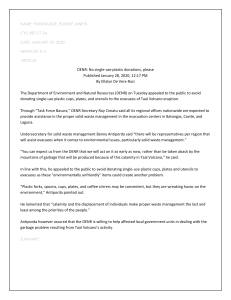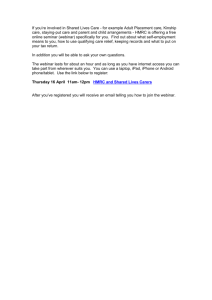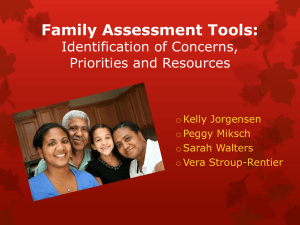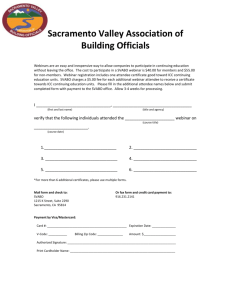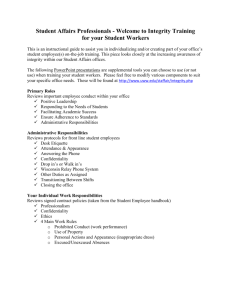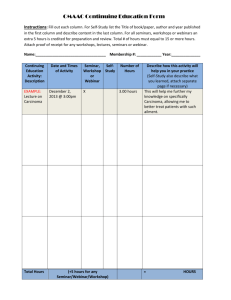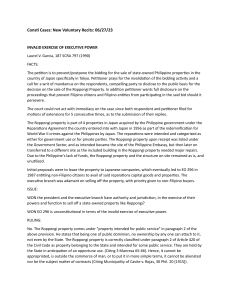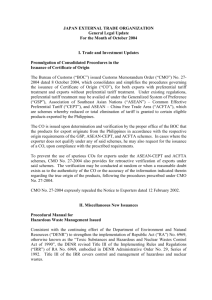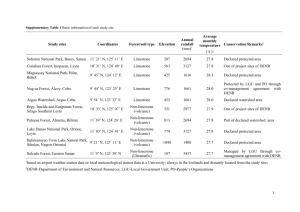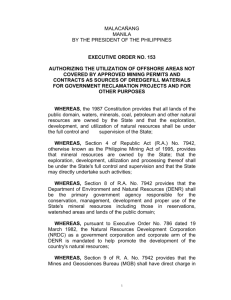10 Low to No-Cost Money Saving Tips for DENR Managers
advertisement
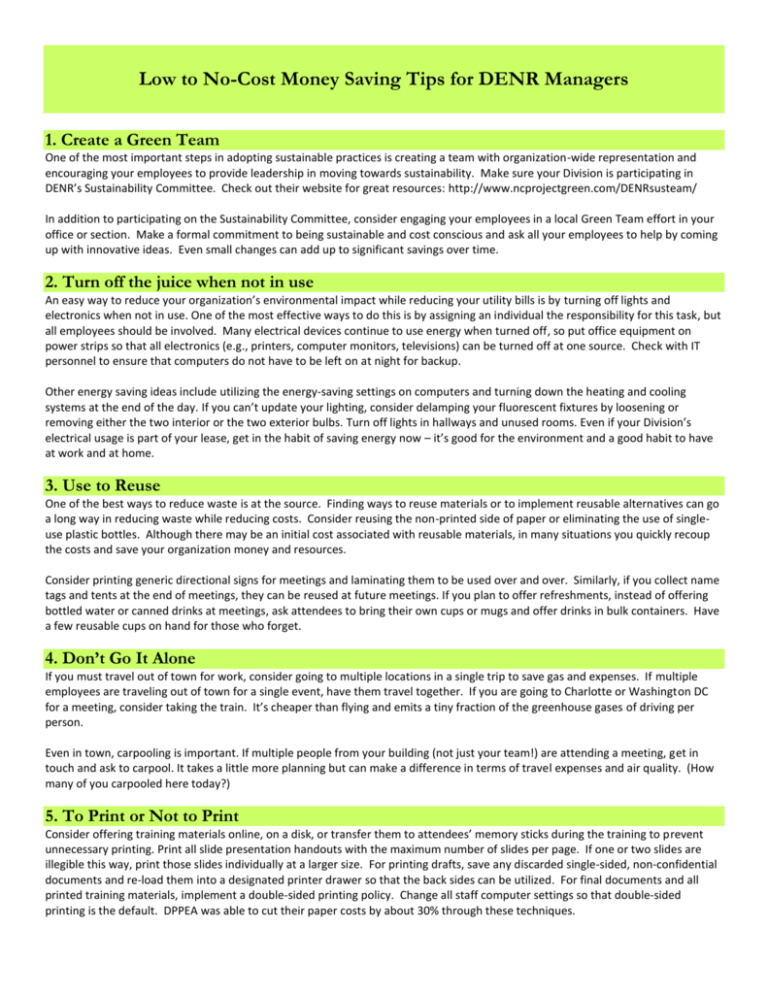
Low to No-Cost Money Saving Tips for DENR Managers 1. Create a Green Team One of the most important steps in adopting sustainable practices is creating a team with organization-wide representation and encouraging your employees to provide leadership in moving towards sustainability. Make sure your Division is participating in DENR’s Sustainability Committee. Check out their website for great resources: http://www.ncprojectgreen.com/DENRsusteam/ In addition to participating on the Sustainability Committee, consider engaging your employees in a local Green Team effort in your office or section. Make a formal commitment to being sustainable and cost conscious and ask all your employees to help by coming up with innovative ideas. Even small changes can add up to significant savings over time. 2. Turn off the juice when not in use An easy way to reduce your organization’s environmental impact while reducing your utility bills is by turning off lights and electronics when not in use. One of the most effective ways to do this is by assigning an individual the responsibility for this task, but all employees should be involved. Many electrical devices continue to use energy when turned off, so put office equipment on power strips so that all electronics (e.g., printers, computer monitors, televisions) can be turned off at one source. Check with IT personnel to ensure that computers do not have to be left on at night for backup. Other energy saving ideas include utilizing the energy-saving settings on computers and turning down the heating and cooling systems at the end of the day. If you can’t update your lighting, consider delamping your fluorescent fixtures by loosening or removing either the two interior or the two exterior bulbs. Turn off lights in hallways and unused rooms. Even if your Division’s electrical usage is part of your lease, get in the habit of saving energy now – it’s good for the environment and a good habit to have at work and at home. 3. Use to Reuse One of the best ways to reduce waste is at the source. Finding ways to reuse materials or to implement reusable alternatives can go a long way in reducing waste while reducing costs. Consider reusing the non-printed side of paper or eliminating the use of singleuse plastic bottles. Although there may be an initial cost associated with reusable materials, in many situations you quickly recoup the costs and save your organization money and resources. Consider printing generic directional signs for meetings and laminating them to be used over and over. Similarly, if you collect name tags and tents at the end of meetings, they can be reused at future meetings. If you plan to offer refreshments, instead of offering bottled water or canned drinks at meetings, ask attendees to bring their own cups or mugs and offer drinks in bulk containers. Have a few reusable cups on hand for those who forget. 4. Don’t Go It Alone If you must travel out of town for work, consider going to multiple locations in a single trip to save gas and expenses. If multiple employees are traveling out of town for a single event, have them travel together. If you are going to Charlotte or Washington DC for a meeting, consider taking the train. It’s cheaper than flying and emits a tiny fraction of the greenhouse gases of driving per person. Even in town, carpooling is important. If multiple people from your building (not just your team!) are attending a meeting, get in touch and ask to carpool. It takes a little more planning but can make a difference in terms of travel expenses and air quality. (How many of you carpooled here today?) 5. To Print or Not to Print Consider offering training materials online, on a disk, or transfer them to attendees’ memory sticks during the training to prevent unnecessary printing. Print all slide presentation handouts with the maximum number of slides per page. If one or two slides are illegible this way, print those slides individually at a larger size. For printing drafts, save any discarded single-sided, non-confidential documents and re-load them into a designated printer drawer so that the back sides can be utilized. For final documents and all printed training materials, implement a double-sided printing policy. Change all staff computer settings so that double-sided printing is the default. DPPEA was able to cut their paper costs by about 30% through these techniques. 6. Go Virtual Reduce dollars and time spent on travel through webinars and conference calls. Some low-cost options are detailed below. Also talk to other DENR Divisions or state agencies that may be able to share their webinar capabilities. Webinar and Conference Call Options Software Qwest conf calls or Meet Me lines Website Call ITS at 919-754-6000 or 1800-722-3946 Details Available to all through DENR ITS Participants unlimited Skype www.skype.com GoTo Webinars www.GoToWebinar.com Up to 40 on conf calls; only 2 for video calls Up to 1,000 Dim Dim http://www.dimdim.com/ WebEx http://www.webex.com/ Free VoIP software – can use for long dist., conf. calls, or video calls Webinar woftware with free phone conferencing, VoIP or both Webinar software with free recording and archiving; built in VOiP Webinar software with free VOIP calling Carahsoft Adobe Connect Pro/Flash http://www.adobe.com/ products/acrobatconnectpro/ Cost $.06/min/person for conf calls; $10 flat fee for Meet Me lines Free $948/yr or $99/mo Up to 20 Up to 100 Up to 1,000 Free $100/yr $1998/yr Up to 25 participants; other plans available One named moderator & up to 100 users; other plans available $69/mo monthly; $59/mo pre-paid for 1 year $375/yr Will be available and preferred option through state contract in ~Aug 2009. Can apply for exception to purchase different software. If you have other low cost webinar or conference call options, please send them to julie.woosley@ncmail.net and they will be posted on the DENR Manager’s Forum website. NOTE: DENR does not support or endorse any webinar software or service company. This information was compiled from DENR Manager’s Forum Workgroup attendees based on experience. For more ways to go green and save money: NC Division of Pollution Prevention and Environmental Assistance’s State Agencies webpage: http://www.p2pays.org/stateagencies.asp DENR Sustainability Committee http://www.ncprojectgreen.com/DENRsusteam/, soon to be moved to http://portal.ncdenr.org/web/sustainability Information on fluorescent bulbs and electronics recycling on State Contract: http://www.p2pays.org/ Massachusetts Agency Sustainability Planning and Implementation Guide http://ncprojectgreen.com/Documents/AgencySusGuide.pdf Georgia P2AD’s Sustainable Office Toolkit: http://www.p2ad.org/documents/offices_home.html
